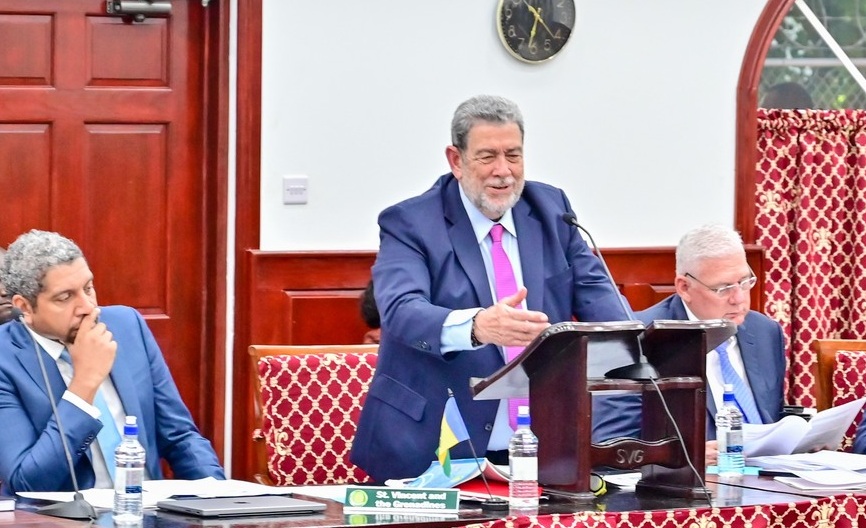SOME INEQUITIES IN CARICOM: URGENT RESOLUTION REQUIRED
[Excerpts of a Speech by the Prime Minister of St. Vincent and the Grenadines at the Opening Ceremony of the 77th Meeting of the OECS Authority on June 17, 2025 at Sandals Resort, SVG]
GENERAL TRADE ISSUE
First, it is evident that the CARICOM trading arrangements have benefitted the member-states with a larger territorial and economic base, particularly in respect of manufacturing commodities; and the comparatively cheaper energy resource in Trinidad and Tobago has additionally made that country’s manufacturing sector the uneven beneficiary from CARICOM’s trade in commodities. Indeed, prior to the OECS member-states signing-on to the CARICOM Single Market and Economy (CSME) of the Revised Treaty of Chaguaramas, the OECS conducted an authoritative economic study which confirmed that the CARICOM arrangements disadvantaged the OECS manufacturing sector.
PROTECTION OF OUR FLOUR
It is, nevertheless, true that without especial protection offered through Article 164 of the CARICOM treaty to the production of flour in the OECS, our Eastern Caribbean Flour Mills’ existence would be in grave jeopardy. But this protection is time-bound, periodically, and always in jeopardy; on the last occasion on which this matter came up for renewal, the opposition of Trinidad and Tobago, Jamaica, and Barbados almost scuttled this protection. Fortunately, my government was able to secure continued protection, under the rules, through the combined support of the OECS countries, Guyana, Haiti, Belize, and Suriname. Next time, will the anchor hold? Undoubtedly, the producers in Trinidad and Tobago want to take over the entire flour market in the Eastern Caribbean. We in St. Vincent and the Grenadines will draw a line in the sand on this!
ABSURD FOREX CONTROLS IN TRINIDAD
Secondly, the foreign exchange control arrangements in Trinidad and Tobago have conspired to reduce to near nothingness a hitherto US$12-to-15 million annual trade in agricultural exports from St. Vincent and the Grenadines. This injustice has caused material difficulties to farmers and the agro-traders of St. Vincent and the Grenadines. Our country pays Trinidad and Tobago annually in excess of US $65 million — we pay in hard foreign currency — for visible imports, mainly petroleum products and manufactured goods, but our sister-CARICOM country cannot even find less than a miserly US $4 million in foreign exchange to pay for our agricultural exports. This is absolutely unfair and ridiculous; our traders are paid in TT dollars which are not convertible outside of Trinidad and Tobago.
THE CLICO-BAICO OVERHANG
Thirdly, the collapse of the CLICO financial empire has left policy holders in the OECS encumbered with hundreds of millions of dollars of losses. There is still outstanding US $64 million of the US $100 million which the last UNC administration under Prime Minister Kamla Persad-Bissessar had negotiated as a partial settlement with the OECS countries. Kamla’s government paid US $36 million shortly before she left office ten years ago, but the successor administration failed or refused to honour the prior commitment. We reasonably expect that the new Persad-Bissessar administration will address this soonest.
OUR AIRSPACE IS OUR PROPERTY
Fourthly, Trinidad and Tobago’s continued control of our OECS air space for its near-exclusive, material benefit through its control of the relevant oversight authority remains a contentious issue which demands urgent resolution. This bristles. Neither Barbados nor the OECS has representation on that oversight body; we get no accounting; there is no transparency. It was a colonial construct, later accorded a measure of seeming permanence to post-independent Trinidad and Tobago.
PATRICK MANNING UNDERSTOOD
It is instructive to note that the Patrick Manning administrations in Trinidad and Tobago realized, in practice, that the OECS countries were unequally yoked in CARICOM, and his successive governments in the 21st century made compensatory arrangements by the establishment of a special fund to assist our countries. Moreover, Patrick Manning, a deeply-committed regionalist in theory and practice, also ensured that foreign exchange was available for our agricultural exports. He, too, was always compliant with Trinidad and Tobago’s contribution to the CARICOM Development Fund (CDF) which was established under Section 158 of the Revised Treaty of Chaguaramas to assist with the socio-economic development of disadvantaged countries, regions, and sectors in CARICOM. A village in my constituency, “Manning Village”, is named in honour of this great Trinidadian and Caribbean leader on account of his profound regional solidarity — a pearl, perhaps greater than his tribe. I would like to name one “Kamla Village” if the circumstances admit.
Up to earlier this year, and continuing, both Trinidad and Tobago and Jamaica have baulked at making their assessed contributions to the CDF. It has been an exercise for the rest of CARICOM akin to pulling teeth without anesthesia. Extremely painful and tiring!
THE OECS SIGNED-ON
The OECS countries had eventually signed-on to the CSME in 2003, two years after we signatured the Revised Treaty of Chaguaramas in 2001. We did so with our eyes wide-open: We knew of the challenges, but we put in the balance at least three other considerations: First, the bundle of “special treatment” measures, inclusive of the CDF, and a protective market for some of our commodities, in Chapter 7 of the Treaty for disadvantaged countries like the OECS member-states; secondly, the more general, and important, CSME provisions relating to free movement of persons and capital, and the like, offered possibilities for the OECS; and thirdly, there was the vital consideration of the enduring value of belonging to CARICOM as an integrated community of nations, and its functional cooperation work in health, education, disaster preparedness, and security, and the coordination of our region’s foreign policy.
CSME MUST BENEFIT US, OR ELSE?
But the Bahamas, as a member-state of CARICOM, is a beneficiary of all the non-CSME values of CARICOM while opting-out of the CSME provisions. The OECS countries may well, most reluctantly, by force of circumstances, have to put on the table the question of the continued relevance of our participation in the CSME, while, of course, remaining in CARICOM, until the inequities referred to herein are satisfied. In that, or any, event, we are called upon to fortify the OECS even more.





